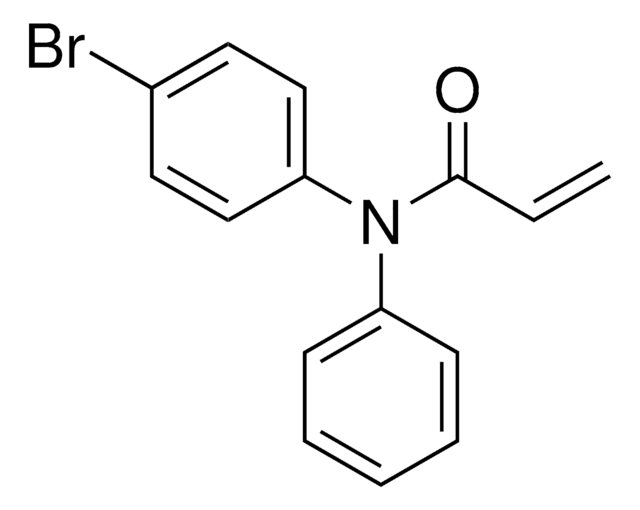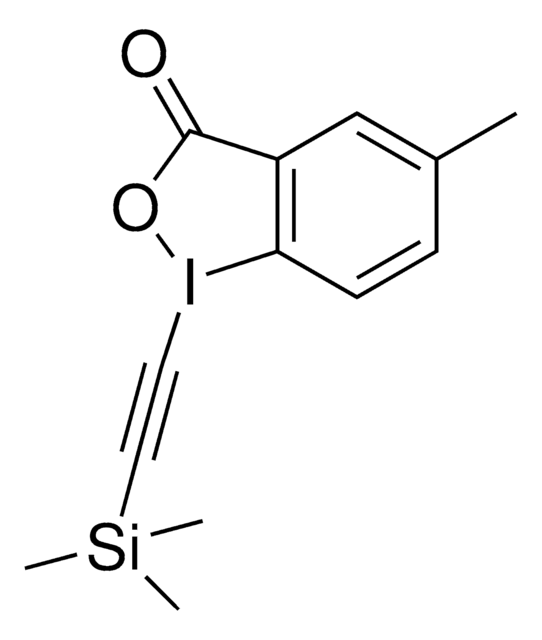推荐产品
品質等級
化驗
≥95%
形狀
powder or solid
反應適用性
reagent type: chemical modification reagent
reaction type: click chemistry
儲存溫度
2-8°C
應用
KB05yne is a cysteine-reactive small-molecule fragment for chemoproteomic and ligandability studies for both traditionally druggable proteins as well as "undruggable," or difficult-to-target, proteins. This fragment electrophile is the functionalized version of KB02 (912131)
Related useful products may include: Cysteine-reactive fragments: KB02 (912131), KB03 (912654), KB05 (911798), sulfoxide (925136), CoLDR probe (923818) Functionalized scout fragments: KB02-COOH (925047), KB02yne (925225) Electrophilic degraders featuring scout fragments: KB02-SLF (914738), KB03-SLF (914975), KB05-SLF (913715), Biotin-SLF (914223) Cysteine-reactive probes for chemoproteomics: IA alkyne (924237), IA 5-TAMRA (925020), desthiobiotin iodoacetamide (923826), or biotin iodoacetamide (B2059)Related useful products may include: Cysteine-reactive fragments: KB02 (912131), KB03 (912654), KB05 (911798), sulfoxide (925136), CoLDR probe (923818) Functionalized scout fragments: KB02-COOH (925047), KB02yne (925225) Electrophilic degraders featuring scout fragments: KB02-SLF (914738), KB03-SLF (914975), KB05-SLF (913715), Biotin-SLF (914223) Cysteine-reactive probes for chemoproteomics: IA alkyne (924237), IA 5-TAMRA (925020), desthiobiotin iodoacetamide (923826), or biotin iodoacetamide (B2059)
Technology spotlight: Proteomic Ligandability Assessment
Related useful products may include: Cysteine-reactive fragments: KB02 (912131), KB03 (912654), KB05 (911798), sulfoxide (925136), CoLDR probe (923818) Functionalized scout fragments: KB02-COOH (925047), KB02yne (925225) Electrophilic degraders featuring scout fragments: KB02-SLF (914738), KB03-SLF (914975), KB05-SLF (913715), Biotin-SLF (914223) Cysteine-reactive probes for chemoproteomics: IA alkyne (924237), IA 5-TAMRA (925020), desthiobiotin iodoacetamide (923826), or biotin iodoacetamide (B2059)Related useful products may include: Cysteine-reactive fragments: KB02 (912131), KB03 (912654), KB05 (911798), sulfoxide (925136), CoLDR probe (923818) Functionalized scout fragments: KB02-COOH (925047), KB02yne (925225) Electrophilic degraders featuring scout fragments: KB02-SLF (914738), KB03-SLF (914975), KB05-SLF (913715), Biotin-SLF (914223) Cysteine-reactive probes for chemoproteomics: IA alkyne (924237), IA 5-TAMRA (925020), desthiobiotin iodoacetamide (923826), or biotin iodoacetamide (B2059)
Technology spotlight: Proteomic Ligandability Assessment
相關產品
产品编号
说明
价格
儲存類別代碼
10 - Combustible liquids
水污染物質分類(WGK)
WGK 3
閃點(°F)
Not applicable
閃點(°C)
Not applicable
Electrophilic PROTACs that degrade nuclear proteins by engaging DCAF16
Xiaoyu Zhang, et al
Nature Chemical Biology, 15(7), 737-746 (2019)
Vincent M Crowley et al.
ACS central science, 7(4), 613-623 (2021-06-01)
Covalent ligands are a versatile class of chemical probes and drugs that can target noncanonical sites on proteins and display differentiated pharmacodynamic properties. Chemical proteomic methods have been introduced that leverage electrophilic fragments to globally profile the covalent ligandability of
Xiaoyu Zhang et al.
Nature chemical biology, 15(7), 737-746 (2019-06-19)
Ligand-dependent protein degradation has emerged as a compelling strategy to pharmacologically control the protein content of cells. So far, however, only a limited number of E3 ligases have been found to support this process. Here, we use a chemical proteomic
我们的科学家团队拥有各种研究领域经验,包括生命科学、材料科学、化学合成、色谱、分析及许多其他领域.
联系技术服务部门








